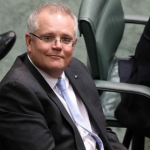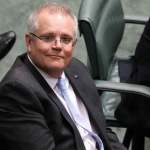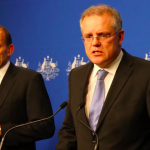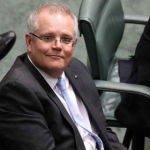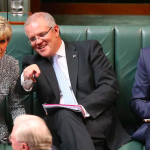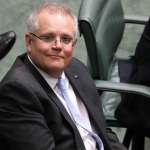A PM’s Faith Shouldn’t Be Steering a Secular Nation
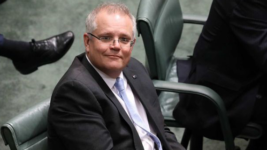
“Australia is not a secular country. It is a free country,” proclaimed our current prime minister Scott Morrison during his maiden speech in federal parliament on 14 February 2008. “This is a nation where you have the freedom to follow any belief system you choose.”
Morrison was right in that Australians do have “freedom to follow any belief system”. As the 2016 Census figures reveal, 30.1 percent of Australians have no religion, 22.6 percent follow Catholicism, 13.3 percent are Anglican, 2.6 percent are Muslims and 2.4 percent are Buddhists.
Where the PM was wrong is that Australia is a secular society. Section 116 of the nation’s Constitution outlines that the state cannot establish a religion, impose any religious observance, prevent people practicing one and nor can it make following a religion a prerequisite to hold office.
As WA University law lecturer Renae Barker pointed out in the Conversation, this nation is an example of Canadian philosopher Charles Taylor’s third form of secularism, in which religion is not entirely removed from the public sphere, instead it’s one voice amongst many.
The prime minister also asserted that his “personal faith in Jesus Christ is not a political agenda” during that first speech. However, prior to grabbing the top job, he was already wearing his faith on his sleeve, and since he’s been at the helm, he’s certainly kept his religious views front and centre.
Religious Christian freedoms
In December 2017, the then treasurer stated in an interview with Fairfax Media that he’d be playing a leading role the following year in the push to enact further religious protections laws, meaning legal provisions that allow people of faith to discriminate against others who don’t think like them.
The religious freedoms debate was sparked by the campaign to grant members of the LGBTIQ community the same human rights as their fellow citizens living under the same legal system by allowing them to marry their chosen partner.
The soon-to-be PM also bragged about being the “principal proponent” of the marriage plebiscite, but failed to mention he abstained from voting on the law. And as marriage equality passed in late 2017, the Liberals established an inquiry into the adequacy of local religious protection laws.
Then just after he “accidently” bumbled into the prime ministership last year, Morrison gave another interview to Fairfax, where he positioned his quest to establish new religious freedom laws at the fore. And he underscored that Christian schoolkids shouldn’t face curbs on their traditions.
Obviously, his faith wasn’t shaping this agenda, and nor did he let it get in the way as he tried to hold back a smirk whilst repeatedly confirming to reporters last October that laws allowing religious schools to turf out teachers and students based on sexuality had already been enacted in the past.
A bigot at the helm
Prior to his gleeful assertion that supposedly forward-thinking Australia still allows educational institutions to discriminate based on “sex, sexual orientation, gender identity, marital or relationship status or pregnancy”, the PM was up in arms about the “values of others” being imposed on his kids.
Newly-unelected prime minister Scott Morrison appeared on shock jock Alan Jones’ 2GB radio program last September, declaring that he sends his children to an independent Baptist school, because he didn’t want other people pushing their ideas on them.
The leader of the country went onto agree with the radio host that an inclusive public school program designed to prevent family violence made his “skin curl”, as it entailed discussion of scenarios involving bisexual and lesbian people.
At the time, Morrison was on a bit of a roll as, just a few days later, he went onto tweet that school counsellors that help out transgender children are “gender whispers”.
Now, not everyone of the Christian faith holds homophobic and transphobic viewpoints. But, the PM does. And not every homophobe or transphobe follows the Christian religion. However, Mr Morrison certainly does, with bells on.
And as soon as he was handed the microphone to lead the nation, he decided that one of his first acts would be to not only target children, but to take aim at some of the most marginalised and vulnerable children in the schooling system.
From the rib
The head of government addressed the WA Chamber of Minerals and Energy on International Women’s Day this year. And he decided to tell those gathered that its “not in our values” to “push some people down to lift some people up”, and he went onto say this “is true of gender equality”.
“We want to see women rise,” Morrison continued to trip over himself. “But we don’t want to see women rise only on the basis of others doing worse.” Again, not every Christian holds this sort of view, but it is an institution that’s been criticised for perceiving women as subservient to men.
While in April, it came to light that as part of the Morrison government’s domestic and family violence package it had put aside $10 million in funding to provide counselling to couples dealing with domestic violence, which, some have seen, as another policy shaped by religious values.
This program has been widely derided for not only placing violent men in a session where they can put forth justifications for their behaviour, but also for placing women in a position where they must take some responsibility for their role in the violence being perpetrated against them.
Love thy neighbour as thyself
During the election campaign, Morrison, in continuing to keep his faith off the agenda, invited reporters to observe him worshipping in the Sutherland Shire’s Horizon Church, which is Pentecostal. This is a faith followed by 1.1 percent of the Australian community.
Morrison is not only famous for being the nation’s first Pentecostal PM, but he’s also quite well-known for being the immigration and border protection minister that launched Operation Sovereign Borders. It was this man of faith who oversaw the offshore incarceration of numerous refugees.
And it’s this fact that might see the argument posited in this article fall through, as the figure of Jesus didn’t seem to profess that all good people should place those fleeing harm in indefinite detention without charge or trial. And therefore, faith in Jesus might not have shaped this agenda.
But, perhaps we should consult another Liberal stalwart, former Cardinal George Pell, to see if it’s possible to properly follow the Christian faith, whilst occasionally straying from its recommended path, before deciding whether to tick the box marked Morrison on the ballot paper.


